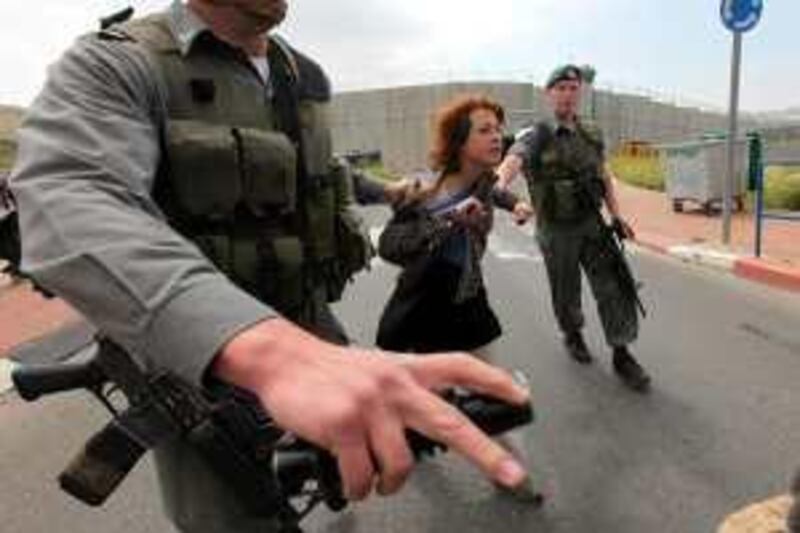RAMALLAH // Arab heads of state wrapped up their summit in Libya yesterday by rejecting all Israeli measures in East Jerusalem and calling on the international community to stop the settlement building there and protect the Al Aqsa mosque compound. Israel's settlement policy poses "a dangerous obstacle to a just and comprehensive peace", the final resolution of the Arab League summit read. There was not, however, consensus - and hence no vote - on whether to withdraw Arab support for US-sponsored indirect talks that have yet to begin and that the Palestine Liberation Organisation is resisting until Israel freezes settlement construction in East Jerusalem.
The Arab League had this month given its backing to the proximity talks, but their start was derailed after an announcement by Israel that it had approved the building of 1,600 new settlement units in East Jerusalem. Amr Moussa, the league's secretary general, said at a news conference yesterday after the final session that Arab leaders are "fed up" with Israel's policies. "The ball is in the Israeli court," he said. "We are waiting to see if they are serious. If they are serious they have to deal with the situation in the occupied territories in a different way."
The summit concluded just as Palestinians in the West Bank faced yet another Israeli ban on travel for the Jewish holiday of Passover. Also yesterday, an Israeli minister threatened to invade Gaza again to "liquidate" Hamas. And with Israeli settlement building continuing unabated in occupied East Jerusalem, Israel and the Palestinians dominated talks in Sirte, the coastal town in Libya that hosted the Arab League's 22nd summit.
Even the call yesterday during a closed-door session for a Middle East free of nuclear weapons was partly directed at Israel. Israel is widely understood to have nuclear weapons, something it has never officially acknowledged. Arab countries suspect Iran is also seeking a nuclear weapons capability. However, unlike Israel, Tehran is a signatory to the nuclear non-proliferation treaty. But a decision to withdraw support for the proximity talks, as had been expected, was not forthcoming. Instead, members chose to defer a vote on the matter. That decision caused some rancour with Syria, which along with Libya was reported to have urged Mahmoud Abbas, the PLO chairman, to abandon the negotiations process altogether and revert to a strategy of armed resistance to Israel's occupation.
Walid Mualem, Syria's foreign minister, said his country would not be a part of any final declaration since it disagreed with the indirect negotiations. Muammer Qadafi, Libya's president, meanwhile, is understood to be ready to withdraw his country's support for the 2002 Arab Peace Initiative, which offers Israel full peace and normalised ties with all 22 Arab League members in return for a full withdrawal from all territory occupied in 1967 and a "just" solution to the Palestinian refugee problem.
However, no decision was reached about the 2002 initiative, which many before the summit had thought would be retracted in Libya. Such lack of decisiveness belied calls from Mr Qadafi, the summit host, Mr Moussa and others that Arab countries needed to come up with practical strategies, not rhetoric. It could further undermine the credibility of the League in the eyes of millions of ordinary Arabs.
One concrete measure that seems certain to be agreed to is to provide Palestinians living in Jerusalem with US$500 million (Dh1.83 billon) to help them cope in the city in the face of growing poverty. There is also a suggestion that Arab countries will seek to bring Israel's Jerusalem settlement construction to a vote in the UN's General Assembly and then in the Security Council. According to a report by the BBC, the US and Qatar recently discussed such an eventuality. It was suggested that the US might abstain from such a vote, which would constitute a dramatic setback for Israel. It has grown used to its closest ally vetoing hostile resolutions in the Security Council.
The report could not be verified, however. Israel, meanwhile, responded to what its foreign ministry called an "aggressive" summit. "We heard aggressive and problematic declarations from Arab League leaders," Danny Ayalon, Israel's deputy foreign minister, said. "We call on the leaders in the region to assist the Palestinians and be part of the political process." Mr Ayalon reasserted Israel's intention to continue building in East Jerusalem, calling it a "legal right".
"For too long our opponents have been able to talk about international law without being held to account. We say strongly and firmly that we have a legal right to build in Jerusalem and those that seek to enshrine the 1949 Armistice Lines, the so-called 'Green Line' as a border have not understood history nor legal precedence." Meanwhile, another Israeli minister yesterday threatened war on Gaza in the wake of an Israeli incursion there on Friday that left four dead, including two Israeli soldiers.
Yuval Steinitz, the finance minister, said Israel would have to find a way to deal with Hamas and could reinvade Gaza to "destroy" the movement should it feel it necessary. "Israel won't allow Hamas to arm with long-range missiles," Mr Steinitz said in an interview with Israel Army Radio. Fawzi Barhoum, a Hamas spokesman, said the remarks affirmed that Israeli "state terrorism" would continue. Mr Barhoum called on international bodies to bring Israeli leaders before international courts as war criminals. The Hamas official further said any relations or normalisation with Israel would only encourage the Israeli government to practice additional "terrorism and criminality" against the Palestinian people.
@Email:okarmi@thenational.ae






